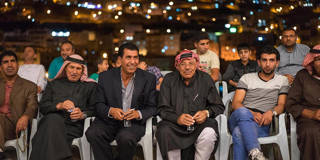Rising literacy rates and rapid advances in communication technology have stirred the Middle East into a maelstrom of competing cultural narratives. Unless Arab and Muslim societies revitalize their homegrown intellectual tradition, the result will be cultural drift or, far worse, the continuation of bloody civil strife.
PARIS – In The Hubris of the Zero Point, the Colombian philosopher Santiago Castro-Gomez describes René Descartes’s 1637 declaration “I think, therefore I am” as the moment white Europeans installed themselves above God as the sole arbiters of knowledge and truth. With this turning point, they began to think of themselves as observers whose scientific methods, morals, and ethics overrode those of other cultures.
Cultural “zero points” are important because they serve as a dividing line – a clear demarcation of “before” and “after” that holds fundamental implications for the development of private and public life. So it is instructive to consider the implications of Castro-Gomez’s concept for the Arab world. Indeed, it could be argued that much of the region’s troubles are attributable to the absence of an indigenous “zero point” onto which a modern culture could be sturdily pinned.
In The Lonely Crowd, the American sociologist David Riesman identified three broad cultural types: tradition-directed cultures that look to inherited rituals, morals, and values for guidance; inner-directed cultures, in which people behave according to self-nourished values; and other-directed cultures that react predominantly to external norms and peer influences. Riesman’s framework has particular resonance in the Arab world today, where rising literacy rates and rapid advances in communication technology have stirred a maelstrom of competing cultural narratives, with his three types competing to define the region’s future.

PARIS – In The Hubris of the Zero Point, the Colombian philosopher Santiago Castro-Gomez describes René Descartes’s 1637 declaration “I think, therefore I am” as the moment white Europeans installed themselves above God as the sole arbiters of knowledge and truth. With this turning point, they began to think of themselves as observers whose scientific methods, morals, and ethics overrode those of other cultures.
Cultural “zero points” are important because they serve as a dividing line – a clear demarcation of “before” and “after” that holds fundamental implications for the development of private and public life. So it is instructive to consider the implications of Castro-Gomez’s concept for the Arab world. Indeed, it could be argued that much of the region’s troubles are attributable to the absence of an indigenous “zero point” onto which a modern culture could be sturdily pinned.
In The Lonely Crowd, the American sociologist David Riesman identified three broad cultural types: tradition-directed cultures that look to inherited rituals, morals, and values for guidance; inner-directed cultures, in which people behave according to self-nourished values; and other-directed cultures that react predominantly to external norms and peer influences. Riesman’s framework has particular resonance in the Arab world today, where rising literacy rates and rapid advances in communication technology have stirred a maelstrom of competing cultural narratives, with his three types competing to define the region’s future.